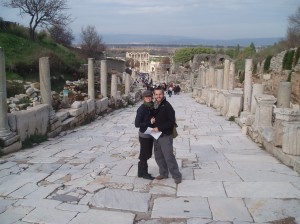This past Sunday night I had the opportunity to teach at our local church gathering. We have been studying the book of Acts all fall and I was assigned chapters 19-23, which make up Paul’s 3rd missionary journey. There are two incidents in the passage that end up turning into all out riots against Paul and the early followers of The Way. The first riot (in Ephesus) comes at the hands of the Greeks, while the second (in Jerusalem) comes at the hands of the Jews. Each riot gives insight into the values that were inherent within the two narratives (although not ideal, “worldview” may be substituted for narrative).
(Pic: Roman Road where Paul would have walked in Ephesus)
Values of the Greek Narrative – Ephesus
- Reasoning, intellect and philosophy bred out of Socrates, Platoand Aristotle
- Religion and magic – They would create gods that would give them power over the forces of life/nature. The god of Ephesus was the fertility goddess Artemis. She represented wealth, security and power. Having sex with prostitutes was a form of worship to Artemis.
- It was acceptable to worship any god, but it was unacceptable to claim that your god was the ONLY god
Values of the Jewish Narrative – Jerusalem
- Oral/written, literal authority of the Hebrew Scriptures (Old Test.)
- Monotheistic (YHWH is only God to be worshiped)
- Liberation from exile will be found in the coming Messiah. He will be a Davidic king who will overthrow the ruling power by military conquest. Jesus did not fit such a description, so (in this narrative) he was not the Messiah.
- Ultimate obedience to Hebrew Scriptures and the Temple
Values of the Narrative of The Way (early church)
- Jesus is the Messiah. He is the Son of God, who after his life, death and resurrection is now enthroned at the right hand of God.
- Kingdom of God is welcome to ALL
- Not measured by wealth, tradition or intellect, but by believing and living as followers of Jesus.
Riot #1 in Ephesus: Acts 19
Although Paul was a brilliant philosopher, who carried much weight in his abilities of intellectual argument and reasoning, his radical message of The Way (affirming the narrative inaugurated in Jesus) posed a threat to the values of the Greek narrative and their god Artemis in Ephesus. To enter his narrative, the Greeks would have to set aside their idols of wealth, security and power. They responded by gathering up 25,000 citizens in a mob-like frenzy and chanting “Great is Artemis of the Ephesians!” for two hours.
Riot #2 in Jerusalem: Acts 21 & 22
 Although Paul was formerly a Pharisee, steeped in his understanding of the Hebrew Scriptures and traditions, he was nearly killed in Jerusalem when he was accused of bringing a Greek (foreigner) to the Temple during festival. In his defense, he tells his story of encountering Jesus on the road to Damascus and the crowd responds by saying, “Rid the earth of him! He’s not fit to live!”
Although Paul was formerly a Pharisee, steeped in his understanding of the Hebrew Scriptures and traditions, he was nearly killed in Jerusalem when he was accused of bringing a Greek (foreigner) to the Temple during festival. In his defense, he tells his story of encountering Jesus on the road to Damascus and the crowd responds by saying, “Rid the earth of him! He’s not fit to live!”
(pic: Temple Courts in Jerusalem)
Summary: The values of the narrative of The Way were offensive to the Greek and Jewish narratives. To re-align their values with the values of Jesus would call into question their livelihood, comfort and security.
Values of the Western Narrative
- Mass consumption leads to stronger economies and a better way of life
- Freedom and peace are found in military strength and overthrow
- Intellectual ascension and reason are more true than experience and story
- Nominalistic religion (faith is inherited/assumed rather than embodied in ALL of life)
As Jesus followers whose primary allegiance is to the narrative of The Way, we have to ask the hard questions of our cultural narrative. We can easily be blinded by our Western values and assume they most clearly define truth, when in reality they often are designed to simply ensure wealth, comfort and security for those of us on this side of the globe.
To question our values hurts. To change our values hurts. I am not saying all of our values are wrong, but I am saying that we have to ask the hard questions of them. Does mass consumption lead to a better way of life for all inhabitants of the earth? Is lasting peace and the freedom of Jesus best achieved through military advancement? Does having all the right answers trump authentic experience as an invitation into God’s Story? Did Jesus’ life, death and resurrection allow for a faith that only impacts certain segments of our lives?
When our values are called into question by the values of Jesus, may we not start a riot, but willingly give up our idols…even if our idols have the appearance of bringing life to our immediate needs.
Which story will we choose to define our values?
 and I quickly responded by retelling the gut-wrenching story of the Mets’ Benny Agbayani hitting a 13th inning game winning homer against us in the 2000 playoffs. My friends were impressed by such specific Giants’ knowledge (or maybe they just thought I was pathetic) and I was happy to oblige, especially now that those memories aren’t so painful having won a World Series.
and I quickly responded by retelling the gut-wrenching story of the Mets’ Benny Agbayani hitting a 13th inning game winning homer against us in the 2000 playoffs. My friends were impressed by such specific Giants’ knowledge (or maybe they just thought I was pathetic) and I was happy to oblige, especially now that those memories aren’t so painful having won a World Series.

 Over the past decade, few books have had the impact on the art of Story than Donald Miller’s A Million Miles in a Thousand Years. He doesn’t simply speak about story, he challenges himself and others to live a better story…a story that could change everything. As you can imagine, Don is paying me thousands of dollars and is going to write a review of my book to pay me back for this post as he sees it as being the exposure that will jump start his career. (oh wait, that MIGHT not be true…).
Over the past decade, few books have had the impact on the art of Story than Donald Miller’s A Million Miles in a Thousand Years. He doesn’t simply speak about story, he challenges himself and others to live a better story…a story that could change everything. As you can imagine, Don is paying me thousands of dollars and is going to write a review of my book to pay me back for this post as he sees it as being the exposure that will jump start his career. (oh wait, that MIGHT not be true…).

